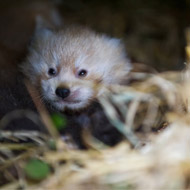
The twins are the second successful red panda birth at Highland Wildlife Park
The Highland Wildlife Park at Kincraig, near Aviemore, is celebrating the birth of twin red panda cubs. The twins were born on the June 15, but images of the tiny cubs have only just been released.
This is the second successful red panda birth at the park as mum, Kitty, also reared a single male cub called Kush in 2013. Kush was the first red panda to be born in one of the Royal Zoological Society of Scotland's animal collections in 13 years.
Douglas Richardson, head of living collections for the Highland Wildlife Park, comments: “We are of course thrilled by the birth of twin red pandas, but it is doubly satisfying as a number of red panda pairs in zoos breed once, then do nothing in subsequent years.
"The fact that Kitty has produced cubs two years in a row is a very strong indication that our enclosure, diet and husbandry regime suits this pair of pandas.”
Native to the Himalayas, red pandas are classified as vulnerable on the IUCN Red List with less than 10,000 individuals thought to remain in the wild - the major threat being the destruction by man of the forested mountain areas where they live. Although they are protected in all the countries where they are found, they are still hunted illegally for their fur and in particular their long bushy tail which is highly prized as a good luck charm for Chinese newlyweds.
It will be a few weeks before Kitty, her mate Kevyn and the un-named cubs, whose sexes are still unknown, will be on display. The park say that "this is a delicate time for both mum and infants." Red Panda cubs are born blind, only opening their eyes after about 18 days.
Image courtesy of Highland Wildlife Park. Credit: Alex Riddell



 The veterinary mental health charity Vetlife is inviting the veterinary community to join it for a sponsored cold-water dip.
The veterinary mental health charity Vetlife is inviting the veterinary community to join it for a sponsored cold-water dip.